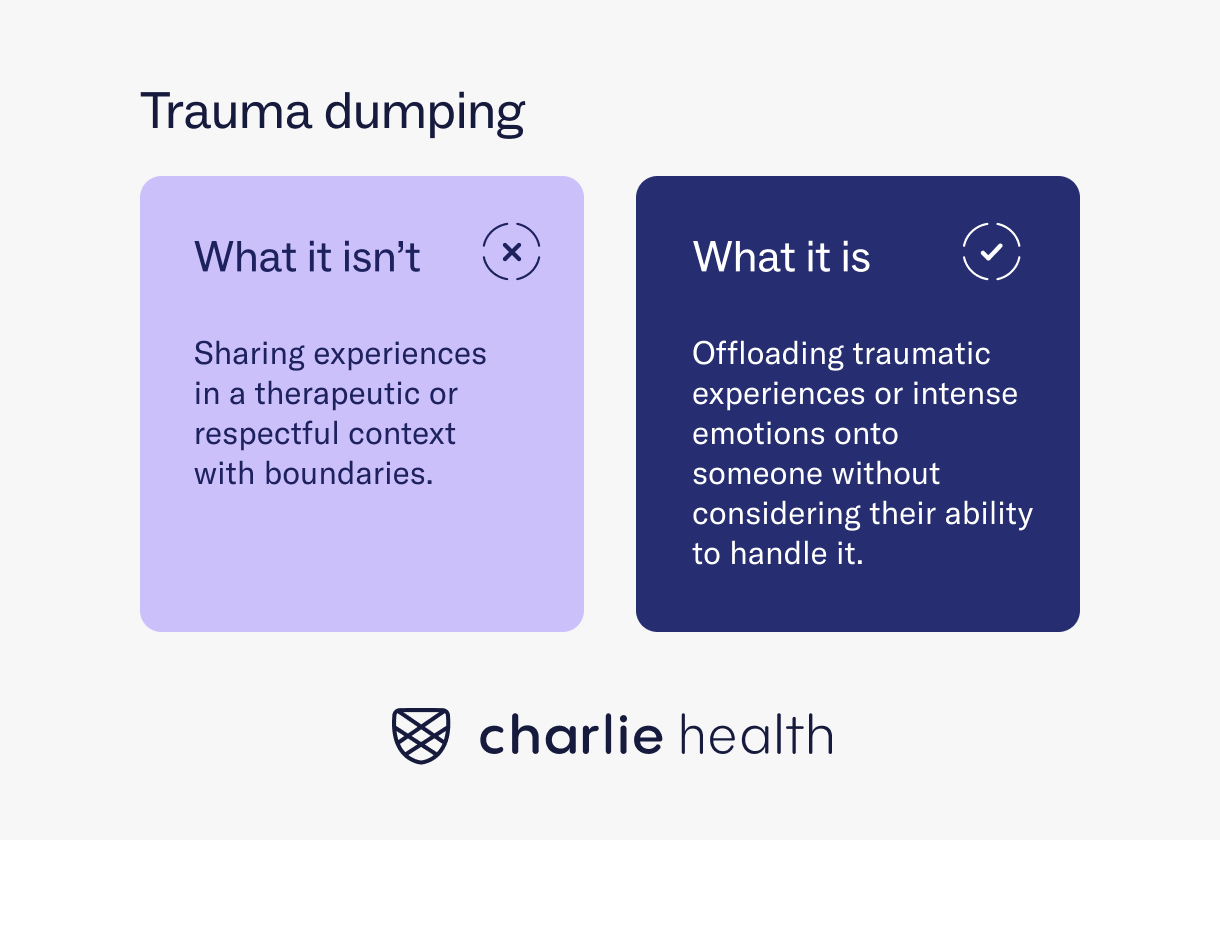
Table of Contents
What Even Is Trauma Dumping?
Written By: Charlie Health Editorial Team

Clinically Reviewed By: Dr. Don Gasparini
Updated: October 24, 2023
7 min.
It’s normal to share what’s on your mind, but constantly unloading about past trauma may mean you’ve crossed the line from venting into trauma dumping.
Learn more about our Clinical Review Process
Table of Contents
After enduring a traumatic event, people have a range of trauma responses, including “trauma dumping.” Also known as emotional dumping, trauma dumping is when someone shares their traumatic experiences or emotional distress with others in an inappropriate and overwhelming way, often without considering the listener’s feelings or consent. It can happen in personal conversations, on social media, or in group settings.
Trauma dumping can be intense for the person sharing their trauma since they’re letting out so much at once after bottling it up, and it can also be burdensome for the person on the receiving end, who is receiving an onslaught of emotions, often without notice.
It’s important to approach discussions about traumatic experiences with sensitivity, respect, and appropriate boundaries. Here’s how to navigate some of those conversations when it comes to the topic of trauma dumping.
What is trauma dumping?
As mentioned, trauma dumping is when someone shares their traumatic experiences all at once with someone else. It can happen with coworkers, acquaintances, or on social media, but it is most common in close relationships. Here are some common signs of what trauma dumping looks like in conversation:
- Dominating conversations by sharing overwhelming stories of past trauma
- Sharing sensitive content without considering the impact on the listener
- Frequently revisiting the same traumatic events
- Continually seeking validation and reassurance from others
- Focusing solely on your own emotions without considering the listener’s well-being
- Rejecting advice or solutions, maintaining a focus on discussing the trauma
- Sharing with friends and family but resisting professional support

Trauma is treatable
Connect with our team of expert trauma therapists to start healing today.
Trauma dumping vs venting
But how do you know when normal venting becomes trauma dumping? In short, trauma dumping goes beyond sharing what’s on your mind—it’s a constant focus on past trauma that can hinder healing and harm mental health and relationships. Here are a few tell-tale signs that you’ve crossed the line from venting into trauma dumping:
Intensity and duration
Trauma dumping often involves intense and prolonged sharing of traumatic experiences and emotions, whereas normal venting tends to be shorter and less intense. For instance, if you’re the person trauma dumping, talking about the traumatic experience may feel like you’re reliving it. You may feel like you’re back in the situation, and it can be hard to shake off.
Frequency
Frequent and repetitive sharing of traumatic content may indicate trauma dumping, while normal venting typically occurs on an occasional basis. For example, if you’re the person trauma dumping, you may find that you’re fixated on the event that you’re discussing. You may be thinking about it all the time or find that it’s hard to think about anything else.
Impact on the listener
If the person receiving the information feels overwhelmed, distressed, or unable to provide emotional support, it may be a sign of trauma dumping. Trauma dumping may occur without the recipient’s consent or without considering their boundaries, while normal venting generally respects the listener’s comfort level.
Balance in conversation
Healthy venting is part of a balanced conversation where both parties can share and support each other. In trauma dumping, the conversation tends to be one-sided and focused solely on the person sharing their trauma.
Content
Trauma dumping often involves sensitive and distressing content that goes beyond everyday stressors, while normal venting addresses everyday challenges.

Why do people trauma dump?
Trauma dumping is, first and foremost, a trauma response, meaning that all of the reasons why someone might trauma dump are related to enduring trauma.
Mental health professionals have identified four main responses to trauma: fight (anger and aggression), flight (fear and the desire to escape), freeze (feeling paralyzed or dissociating), and the more recent addition, fawn (being submissive and compliant). Trauma dumping can coincide with fawning, as people may trauma dump as a way to establish a connection with others, or it can be seen as an independent trauma response.

Since trauma dumping usually results from surviving a traumatic event, it can also be linked to conditions like post-traumatic stress disorder (PTSD), where intrusive memories and emotional distress are part of the condition. People with PTSD may find it challenging to control their need to talk about their trauma, resulting in trauma dumping.
Trauma can be an overwhelming burden, and sharing it with someone can provide temporary relief. However, trauma dumping can also be driven by a lack of coping strategies, emotional dysregulation, or an inability to process the trauma in a healthy manner. Additionally, some people may not be aware of the emotional toll their sharing takes on others, leading them to repeatedly discuss their trauma without understanding the boundaries necessary in a healthy conversation.
Consequences of trauma dumping
There’s no shame in seeking support from friends after enduring trauma, but it’s crucial to be mindful of how you share your experiences, as oversharing can unintentionally hurt or trigger others. Consulting a therapist can be a constructive way to process painful experiences and develop better coping skills, with the understanding that there is no wrong way to deal with trauma as long as it promotes self-care and avoids harm to oneself or others. With that in mind, here are some (often unintentional) consequences of trauma dumping:
Transferring emotional burden
While trauma dumping may provide temporary relief to the person sharing their experiences, it often transfers their emotional burden to friends and family, potentially making them feel like a burden to their loved ones damaging their self-esteem and sense of worth.
Isolation
Trauma dumping can lead to feelings of isolation, as the person may believe that their friends and family cannot comprehend or support them adequately, causing them to withdraw further.
Re-experiencing trauma
Sharing traumatic experiences through trauma dumping can trigger the person to relive their trauma as they react to their friends and family’s responses.
How to handle trauma dumping
Handling trauma dumping, whether you’re the one sharing or receiving, requires sensitivity and care. Here are some steps to navigate these challenging conversations effectively.
If you’re the person on the receiving end of trauma dumping
When you find yourself on the receiving end of someone’s trauma dumping, it’s crucial to respond with empathy, respect, and mindfulness while also maintaining your own boundaries. Start by creating a safe and supportive space for the person to share their experiences without probing questions or dismissiveness. Be a good listener, offering support and understanding, and avoid forcing them to relive their trauma or giving unsolicited advice.
While it’s important to be respectful and understanding in situations where someone confides in you about their trauma, your boundaries also deserve to be respected. It’s acceptable to communicate if you start feeling uncomfortable and need to take a step back from the conversation. Maintaining well-defined boundaries is an essential part of building healthy relationships. Instead of serving as the sole source of support for someone processing trauma, you can suggest trauma-focused resources or support groups to assist them.

If you’re the person who is trauma dumping
Dealing with trauma can be overwhelming, but it’s essential to find healthy ways to process and share your experiences while nurturing genuine connections with others. Here’s a guide on how to manage your trauma and develop meaningful relationships:
Find outlets for healthy emotional expression
Avoid bottling up your emotions. Find constructive outlets such as writing, art, or exercise to express yourself in a healthy way. Identify the triggers that make you feel unsafe or disconnected and work on managing them through practices like meditation, journaling, or therapy.
Prioritize self-care
Take care of your physical and emotional well-being by maintaining a balanced diet, ensuring adequate sleep, and engaging in regular exercise. This will help you feel physically and emotionally stronger. Practice self-compassion by being gentle with yourself and forgiving your own mistakes.
Seek professional help
Don’t keep your trauma to yourself. While sharing with people you trust can help you process your feelings and prevent becoming overwhelmed, it is not a replacement for professional trust. Consider the support of a trauma-informed therapist to work through your trauma in a safe and supportive environment. Remember that seeking help is a sign of strength, not weakness.
Trauma support at Charlie Health
If you or a loved one have endured a traumatic experience, you don’t have to heal alone. Charlie Health is here.
Our virtual Intensive Outpatient Program (IOP) offers more than once-weekly support to people with complex mental health conditions and their families—including those who have survived childhood trauma, sexual trauma, and more. Charlie Health’s expert clinicians use evidence-based, trauma-informed therapies in group sessions, individual counseling, and family therapy to support those processing trauma. Our IOP offers a safe space to receive professional help and emotional support. If past trauma or trauma dumping is interfering with your relationships, we’re here for you.




